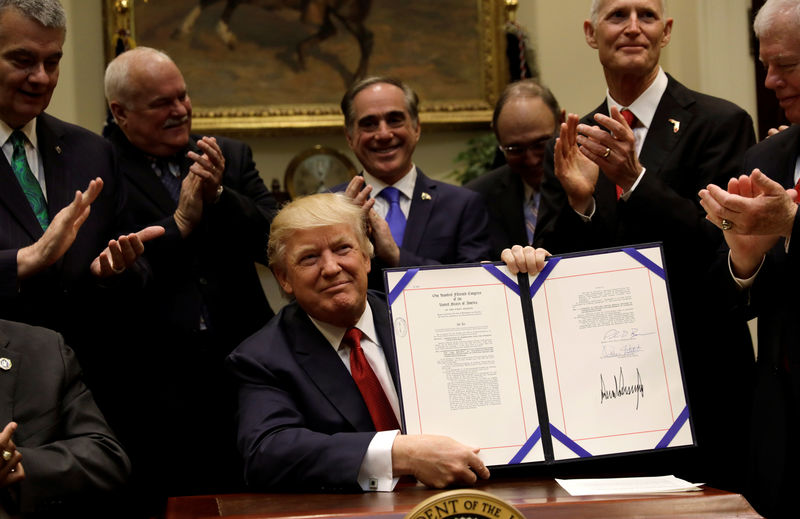By Lisa Lambert
WASHINGTON (Reuters) - President Donald Trump on Wednesday moved a step closer to fulfilling his campaign promise to reform the troubled Veterans Affairs department, but some veterans groups are concerned that the administration may be working toward privatizing their healthcare.
Trump signed a law extending the pilot "Veterans Choice" program, which allows some veterans to receive healthcare from local doctors and hospitals closer to their homes than the VA's 150 hospitals and nearly 1,000 outpatient clinics. The law eases procedures for reimbursing private providers and creates a system for sharing medical records with them.
"This new law is a good start, but there is still much work to do," Trump said at a signing ceremony attended by VA Secretary David Shulkin and Florida Governor Rick Scott. "We will fight each and every day to deliver the long-awaited reforms our veterans deserve."
Trump pledged to hold a news conference next week on "all of the tremendous things that are happening at the VA and what we've done in terms of progress and achievement."
Reforming the agency, rocked by a waiting-time scandal in 2014, was one of Trump's most-repeated campaign trail promises. He has frequently suggested having the government pay outside physicians to provide veteran healthcare.
During his confirmation hearings, Shulkin said he supported overhauling the agency but did not believe in privatizing it. Still, on Tuesday the VA announced it was seeking cutting-edge treatments from the healthcare industry for brain injuries, mental health problems and chronic pain.
Extension of the "Veterans Choice" program could worry Democrats and other critics that Trump and Shulkin are inching toward sending some of the $65.6 billion the department spends annually on medical care to corporations and private businesses.
Conservatives calling for privatization say the VA provides medical services to only about 45 percent of veterans, and they point to delays and inefficiencies dogging the current system.
Some veterans groups and Democrats have warned against moving funds away from healthcare providers with expertise in injuries and illnesses unique to serving in the armed forces.
In a March report, the Government Accountability Office said veterans in the Choice program still face long wait times, mostly because cases must be referred to private contractors for scheduling.

Last year a congressionally mandated panel of experts found the Choice program was inefficient, but recommended establishing a community-based healthcare system that would include private doctors.